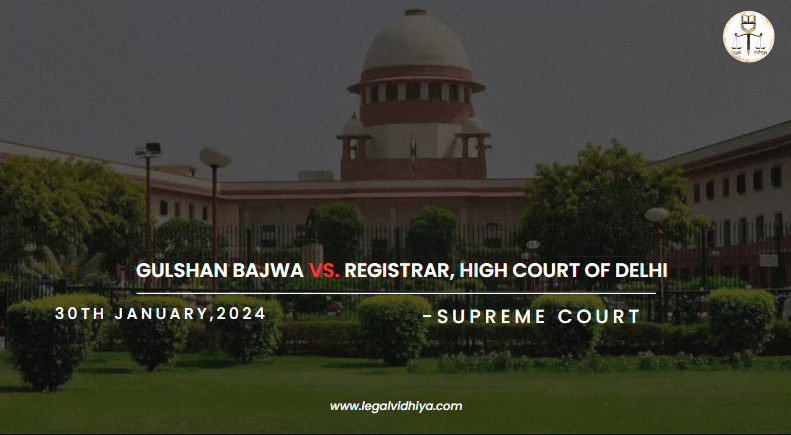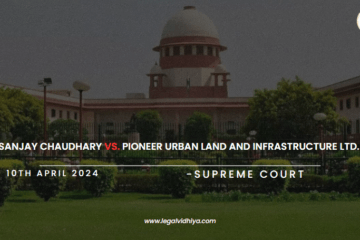
| CITATION | Criminal appeal no. 577/2007 (Crl) No. 9689/2018 |
| DATE OF JUDGEMENT | 30TH January,2024 |
| COURT | Supreme Court of India |
| APPEALLENT | Gulshan Bajwa |
| RESPONDENT | Registrar, High Court of Delhi and ANR |
| BENCH | Pamidighantam Sri Narasinha, Vikram Nath |
INTRODUCTION
The Gulshan Bajwa Vs. Registrar, High Court of Delhi and ANR case pertains to a criminal contempt matter. The case originated from Criminal Contempt No`s 16 and 17 of 2006 in the Delhi High Court. Gulshan Bajwa, the appellant, is an advocate and a former member of the army. The High Court found him guilty in accordance with the Contempt of Courts Act, 1971 noting several instances of disrespectful conduct. Threatening a female advocate, regularly missing court dates, making baseless accusations against judges, and acting in a consistently inappropriate manner are some examples of these actions. The subsequent legal actions are framed by the factual background.
FACTS OF THE CASES
- The case titled Gulshan Bajwa Vs. Registrar High Court of Delhi and ANR pertains to a criminal contempt matter. On 17.08.2006, a Writ Petition was filed before the High Court of Delhi by the Appellant who was appearing as a counsel in a case.
- The Appellant sought an adjournment in the High Court and after the adjournment was granted by the Court, the High Court noticed that the Appellant was giving threats to the lady counsel who was appearing on the behalf of the opposite party. The opposite counsel raised her complaint to the Court and the Court requested the Appellant to appear before the Court and passed an order directing him to explain his conduct.
- Despite repeated calls by the Hon’ble Court, the Appellant failed to appear before the Court to explain his conduct. The Appellant also sent another counsel to seek adjournment stating that the Appellant was not well. However, a standing counsel of Union of India provided that he had seen the Appellant in the Court premises on the same day.
- On the other hand, the Appellant filed an application seeking transfer of the said Writ Petition to a different bench of the High Court and made reckless and unsubstantiated allegations against the judges of the High Court. A Show Cause Notice was issued by the Bench to the Appellant asking him to show cause as to why proceedings under the Contempt of Courts Act, 1971 should not be initiated against him.
- Even after multiple attempts to call the Appellant in the Court, the Appellant failed to appear before the Court and thus, the High Court issued bailable and then non-bailable warrants against the Appellant. The Appellant still did not appear and ultimately the Hon’ble High Court had to call the Deputy Commissioner of Police, New Delhi to ensure the presence of the Appellant in Court.
- On 18.09.2006, the Appellant was produced before the Court and was also released upon furnishing a bail bond. Later, the High Court held that the Appellant was guilty of criminal contempt, citing his use of undesirable language, making wild allegations, and threatening legal professionals.
- The court noted that Mr. Bajwa’s conduct was reckless and interfered with the administration of justice, leading to the issuance of a show cause notice for contempt.
- In another case [Naveen Malhotra VS State of Delhi][Naveen Malhotra VS State (Govt. of NCT of Delhi)], Mr. Bajwa filed petitions seeking the transfer of complaint cases under the Negotiable Instruments Act from one court to another. These petitions requested the transfer of the cases titled “Gulshan Sethi Vs. Naveen Malhotra” to a different court. The specific details and reasons for the transfer were not provided in the available data.
- Additionally, there is a mention of a marriage dispute between Smt. Simranjeet Kaur Sidhu and Manjinder Singh Bajwa [Hardeep Kaur VS Upinder Singh Sidhu]. The complainant alleged that Mr. Bajwa left her company after 13 days of marriage and did not resume it.
- The complainant’s counsel referred to various judgments to support their arguments.In another case [SANTOKH SINGH VS SHAGUN FARM PVT LTD. ], the issues framed include whether the defendant, Gulshan Kumar, agreed to sell agricultural land to the plaintiffs and whether the plaintiffs have paid the advance sale consideration. The specific details and arguments presented in this case were not provided in the available data.
ISSUES
- Whether there was actual criminal contempt of court?
- Whether the order by the High Court was based on the opinion of the judges?
- Whether the imprisonment and fine imposed by the High Court was justified?
APPEALENT`S ARGUMENTS
One of the main questions addressed in the appeal was whether the appellant’s actions truly amounted to criminal contempt. The legitimacy of the High Court’s conviction under the Contempt of Courts Act, 1971 was a major issue of argument.
RESPONDENT`S ARGUMENTS
We have also heard the learned counsel for the Respondent. It was their submission that the order impugned herein has been rendered after a detailed consideration of the material placed before them. It was submitted that the appellant had appeared before the Court pursuant to service of show cause notice under the Act, and the submission that there was no proper service of notice is not correct. It has also been contended that till date, the appellant has never apologised for his actions. In fact, even before this Court, he has been writing letters making reckless allegations against Judges and the Judiciary.
JUDGEMENT
The Supreme Court held that the Appellant, was submitting letters making reckless allegations against the Judges and Indian Judicial System even in the present Appeal in the Supreme Court. Moreover, the Appellant had still not submitted any kind of apology from his end. The Supreme Court reiterated the judicial precedents of M.B. Sanghi, Advocate v. High Court of Punjab & Haryana[1] and Pritam Pal v. High Court of M.P., Jabalpur[2], relied on by the High Court while passing the impugned Order dated 19.10.2006. Further, the Supreme Court highlighted that a contemnor ought to be punished with imprisonment for making libellous and motivated allegations against the Court and its Judges which interfere with the administration of justice. Moreover, the Apex Court was of the opinion that the High Court was correct in not accepting the apology tendered by the Appellant since it was not bonafide and lacked sincerity, apart from being belated and a mere ‘lip service’. Hence, the Hon’ble Supreme Court held that the High Court’s Order requires no interference and the Appellant was rightly convicted for the offence of contempt of Court. The Supreme Court affirmed the finding of conviction, with a modification to the sentence. Considering the Appellant’s age and his claim of medical ailments, the sentence was adjusted from imprisonment of 3 months to imprisonment till the rising of the Court.
ANALYSIS
The appellant’s actions, including threats, non-appearances, unfounded accusations, and a pattern of misbehaviour, were carefully examined by the Supreme Court. The Court maintained the conviction of the High Court, concluding that these conduct constituted a purposeful interference with the administration of justice. Significantly, the appellant’s apology was turned down because it was thought to be genuine given the gravity of the acts of contempt. The ruling emphasised how crucial it is to preserve judicial officers’ honour and reputation. Considering the appellant’s age and health issues, the Court changed the punishment from three months in jail to “imprisonment till the rising of the court,” but upholding the conviction. Three related cases were also de-tagged, a sign that the Court plans to take up each of them in a different hearing.
CONCLUSION
The Supreme Court concluded that the conduct of the Appellant constituted a purposeful interference with the administration of justice. The Hon’ble Supreme Court dismissed the Appeal filed by the Appellant and upheld the judgement passed by the High Court of Delhi. However, the Apex Court modified the sentence of the Appellant from 3 months imprisonment to till the rising of the Court. The ruling emphasised how crucial it is to preserve Judicial Officers’ honour and reputation.
REFERENCE
- https://indiankanoon.org/doc/100393091/#:~:text=We%20are%20of%20the%20opinion,evidencing%20contriteness%2C%20cannot%20be%20accepted5.
- https://main.sci.gov.in/supremecourt/2007/2115/2115_2007_8_1501_50036_Judgement_30-Jan-2024.pdf
-Written by RIYA SHARMA, an intern under legal vidhiya.
Disclaimer: The materials provided herein are intended solely for informational purposes. Accessing or using the site or the materials does not establish an attorney-client relationship. The information presented on this site is not to be construed as legal or professional advice, and it should not be relied upon for such purposes or used as a substitute for advice from a licensed attorney in your state. Additionally, the viewpoint presented by the author is of a personal nature.






0 Comments